|
Printables |
PowerPoints |
Online exercises |
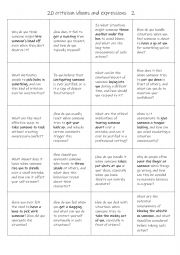
|
B1+-C1 20 criticism idioms and expressions 2
This is a speaking reinforcement activity to supplement the other worksheet I uploaded on 9 / 1 / 2025. Students working in pairs or small groups can either ask each other the questions or answer the question themselves.
Level: intermediate
Age: 12-100
Type:
Downloads: 110
|
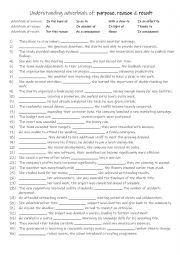
|
B1+ -C1 Understanding 12 adverbials of purpose, reason & result Part 2
This is part 2 of Learning to use adverbials of purpose, reason, and result enhances clarity and coherence in communication. These adverbials allow students to express intentions, causes, and outcomes clearly, making their speech and writing more logical and well-structured. Mastering these adverbials also helps them link ideas smoothly, providing ...
Level: intermediate
Age: 9-100
Type:
Downloads: 114
|
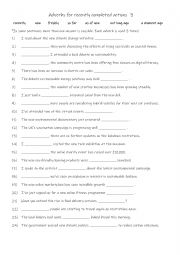
|
A2+-B17 different adverbs for recently completed actions 3
First, students need to familiarise themselves with the 7 adverbs. Then they read the sentences to work out which one is needed to complete the gap-fill. Each adverb is used 3 times! Answers on page 2
Level: elementary
Age: 10-100
Type:
Downloads: 107
|
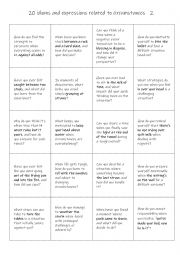
|
B1+-C1 Circumstance idioms and expressions 2
This is a speaking reinforcement activity to supplement the other worksheet I uploaded earlier this year. Students working in pairs or small groups can either ask each other the questions or answer the question themselves.
Level: intermediate
Age: 12-100
Type:
Downloads: 121
|
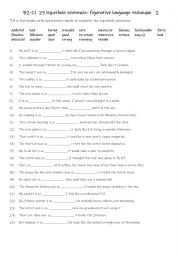
|
25 hyperbole sentences- figurative language technique 2
Learning hyperbole enhances creativity and helps students to express ideas vividly, making their writing more engaging and impactful. It improves communication skills by adding humour or emotional depth, while also fostering a better understanding of cultural and literary nuances. Recognising and using hyperbole sharpens analytical thinking, as stu...
Level: intermediate
Age: 12-100
Type:
Downloads: 124
|
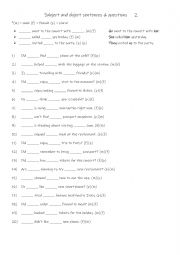
|
A1 Subject and object sentences & questions 2
Students complete the subject and object sentences & questions using the following key: *(m) = male (f) = female (p) = plural. Answers on page 2.
Level: elementary
Age: 8-100
Type:
Downloads: 118
|
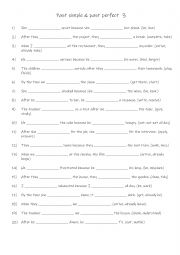
|
Past simple & past perfect 3
Learning the past simple and past perfect tenses is crucial for students as it helps them communicate clearly about past events, showing when actions occurred and how they relate to one another in time. Mastering these tenses improves storytelling, writing, and speaking, enabling students to convey events in a logical and nuanced way. Additionally,...
Level: elementary
Age: 9-100
Type:
Downloads: 109
|
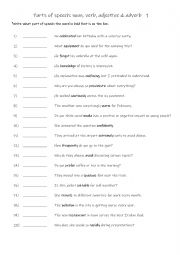
|
Parts of speech noun, verb, adjective & adverb 1
Learning parts of speech�nouns, verbs, adjectives, and adverbs�is essential because they are the foundation of English grammar. Mastering them helps students build grammatically correct sentences, communicate more effectively, expand their vocabulary, improve reading comprehension, and perform better in exams and writing tasks. Answers on page 2.
Level: elementary
Age: 8-100
Type:
Downloads: 106
|
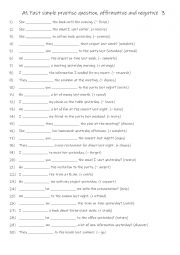
|
A1 Past simple practise question, affirmative and negative 3
Learning the past simple tense with questions, affirmative, and negative sentences is essential for students as it enables effective communication about past events. It provides a foundation for understanding grammar and constructing basic sentences, which is crucial for daily conversations. Mastering these forms ensures students can ask questions,...
Level: elementary
Age: 8-100
Type:
Downloads: 130
|
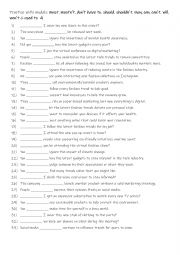
|
A1+-A2 Practise with modals must, mustn�t, don�t have to, should, shouldn�t, may, can, can�t, will, won�t & used to 4
First, students need to familiarise themselves with the modals and their use. Then they read the sentences to see which one is needed to complete the sentence. Answers on page 2.
Level: elementary
Age: 8-100
Type:
Downloads: 123
|
|
|
|
|












